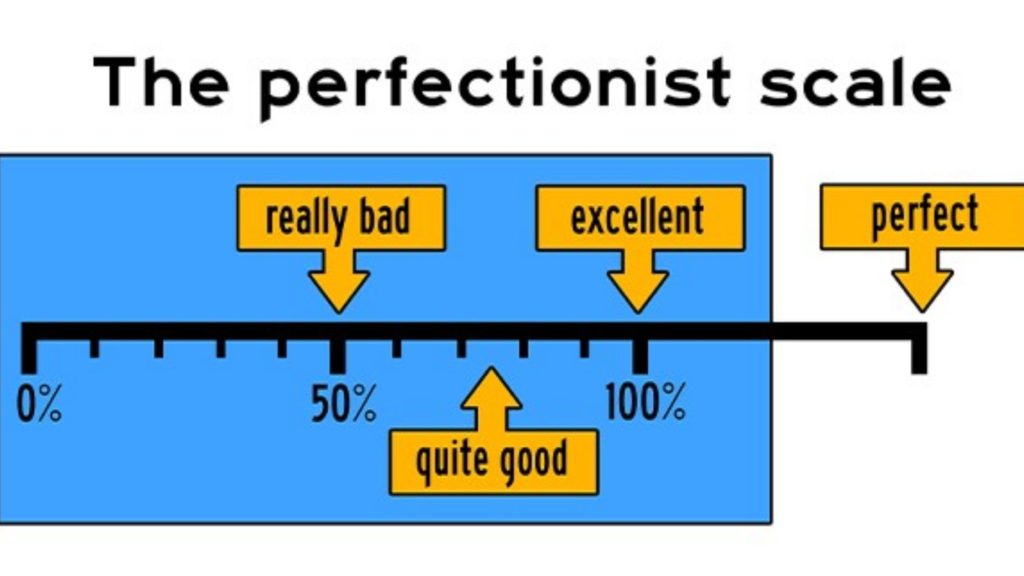When carrying out research for my book Quietly Visible: Leading With Influence and Impact as an Introverted Woman, 53% of introverted women who were senior leaders that I surveyed said perfectionism was an issue for them.
Having reached senior leadership roles, these women were admired for their successful careers. But what could not be seen from the outside was the internal pressure these women put on themselves.
Many factors contribute to perfectionism which often stems from childhood. A fear of failure, and seeking approval are often at the root of it. Parents not understanding the impact of constantly pushing their children to do well. Putting pressure on them to always get top grades can leave a child fearing failure.
A child who has been made to feel that they are not good enough because of introversion, may experience self-doubt. This can bring about a need to strive for perfection in order to get ‘approval’ and can stay with them into adulthood. Perfectionism becomes a problem when it causes anxiety and affects relationships both with yourself and others.
The impact of perfectionism
Perfectionism can be stressful. It can affect decision making because you become so concerned about making the right decision and worry about the consequences of making the wrong decision. It can stop you from delegating work because you do not trust anyone else to do the job as good as you. It can lead to procrastination and delay.
Leaders who are perfectionists may be successful in their careers, but a fear of failure and wanting approval can bring about perfectionist tendencies. They can spend hours stressing and trying to perfect a piece of work or a project, only to find that the effort that they have put in has not been recognised. And in the absence of feedback either way, they imagine the worst. Even if there is no evidence to support their belief.
If you were made to feel like you were not good enough, let it go
If you were made to feel like you were not good enough because you did not meet someone’s expectation of you, let that go. Recognise the impact that those words have had over your life and choose not to let them control you.
If it was your parents or caregivers, they may have said it based on their lived experience of how they were raised and may not have known any better. Or it could be that they had a tough upbringing where life was a constant struggle. As a result, they may have only wanted the best for you and for you to do well, not realising the impact of pressuring you to succeed would have.
It may be that you are different to the dominant group in your organisation, and as such, you think that failure will cause others to see that you are not good enough. If this is the case, remember you are in the role because you were deemed the best person for it.
If you fear failure, remind yourself of your achievements
If you have a fear of failure about something new that you need to do, look back to when you first started doing the things that you are experienced in now. What did you do back then to overcome your fears? How can you apply what you did back then to your situation now?
Look back over your life and career and list all your achievements and remind yourself of all that you have accomplished. You have succeeded at many things in the past and you can do so again. And in those situations where you did not succeed, rather than looking at them as failure, view them as lessons learned and apply the learning.
Go easy on other people and on yourself
If other people do not live up to your perfectionist standards, accept that not everyone shares your perfectionist ideals and that this doesn’t mean that they are not good enough. If they are meeting the required standard, let good be good enough. Encourage excellence, but not perfectionism.
There are many aspects to you, some things you are good at, some things that you aren’t so good at, and some things that you just can’t do at all. We all have our flaws and imperfections but accepting these rather than beating ourselves up about them is more helpful for us.
You can work on improving the things that you are not good at, but just because you are not good at these things, it does not make you a failure. Don’t over generalise and magnify your weaknesses, we all have areas of weakness.
Being a perfectionist can be stressful and can affect your self-confidence, but it doesn’t have to be like that. Accept yourself for who you are, strive for excellence, yes, but recognise when good is good enough.
Are you a perfectionist? If so, what impact does it have on you? If you have overcome perfectionism, please share how you went about it, someone else reading this may benefit from your experience.
First published on LinkedIn.
If you are an introverted woman and a senior leader and want to increase your confidence, influence and impact, take my free assessment and get a report identifying areas to develop. You can take the assessment here.

